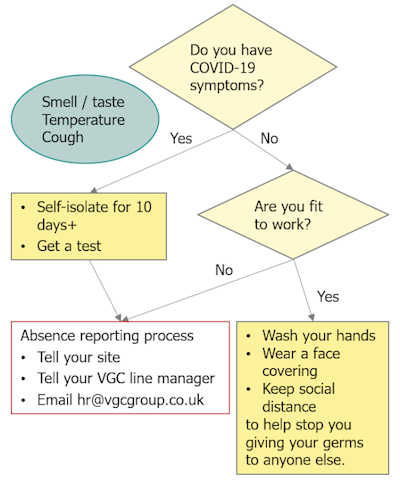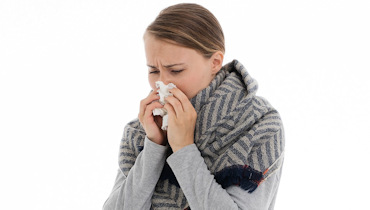VGC self-isolation guidance for staff
Here is what you should do if you start to feel ill.
Colds
- Blocked or runny nose
- Sore throat
- Headache
- Pressure in ears and face
- You feel unwell, but can carry on.
If you have a cold
- Keep following coronavirus precautions. They will help to stop you giving it to anyone else.
- If you think you can do your (full) job from home, talk to your line manager about whether that is possible.
Flu
- Like a cold, but worse – and comes on quicker
- You feel exhausted and can’t carry on.
If you have flu
- Follow normal absence reporting processes.
COVID-19

- High temperature
- A new continuous cough
- Change to your sense of smell or taste
If you have (COVID-19 (coronavirus) symptoms
- Self-isolate immediately.
- Get a coronavirus test.
- Follow normal absence reporting processes.
If you are worried about an illness, visit the NHS website or call 119 for advice.
Absence reporting
- Tell your site
- Tell your VGC line manager
- Email hr@vgcgroup.co.uk
For more information, see our absence reporting page.
If a test is positive or you have COVID-19 symptoms
You must self-isolate for 10 days. See the NHS website for details about self-isolation.
After 10 days:
- If you feel fine, you can go back to work.
- If you still have a high temperature, a runny nose, or upset tummy, keep self-isolating until you are better.
- If you have diarrhoea or vomiting, stay at home until 48 hours after these symptoms stop.
You must self-isolate for 10 days*
- if someone in your household gets COVID-19 symptoms or a positive test
- if NHS Test and Trace tells you that you have been in contact with someone who has coronavirus
- if you come back from travelling to somewhere not in the government list of approved ‘travel corridor’ countries.
Testing
You should get a test as soon as possible if you have COVID-19 symptoms. The test should be done in the first five days.
If you cannot get a test, tell your VGC line manager.
We have been told that new tests are released at 20:00 so try to log-in to the test-booking website as close to this time as you can.
VGC has a small number of test kits for business-critical roles such as business heads and payroll. If you are a business head and need one of these tests, please speak to Ciara Pryce.
Finances
 If you have to self-isolate because of symptoms (yours or someone in your household), you may be eligible for statutory sick pay (SSP). VGC may require you to give proof that you are eligible for sick pay.
If you have to self-isolate because of symptoms (yours or someone in your household), you may be eligible for statutory sick pay (SSP). VGC may require you to give proof that you are eligible for sick pay.
If you have to self-isolate because you have been on holiday, you are not able to get sick pay. You will need to take the time as annual leave.
There is more information on the government website.
You may be able to get Universal Credit at the same time as SSP. Universal Credit includes extra money for children and for rent. If you get Universal Credit plus SSP, the total Universal Credit may be reduced by the amount of your SSP.
If you are worried about money, there are lots of places which can help.
If you have children in your household
- If your child is been sent home because they have been in contact with someone who has tested positive, the child must self-isolate for 10 days. The rest of the household does not need to self-isolate. But make sure you follow COVID hygiene guidelines.
- If your child starts to develop symptoms, you must get them tested. The whole household must self-isolate until you get the test results.
- If your child – or anyone in your home – tests positive, the whole household must self isolate for 10 days.
Remember to tell your VGC line manager about your situation, and email hr@vgcgroup.co.uk (as set out in our absence reporting process).
If you are self isolating because you, or someone in your household, has had a positive test, you can get statutory sick pay.
- You can take holiday to look after a child who is at home – book online at vgcgroup.co.uk/holiday
- If you are on a contract of employment and have worked for VGC for over a year, you can take parental leave to look after your child. Parental leave is unpaid, and must be taken for a minimum of one week.
Main symptoms of COVID-19
The main symptoms of coronavirus are:
- a high temperature – this means you feel hot to touch on your chest or back (you do not need to measure your temperature)
- a new, continuous cough – this means coughing a lot for more than an hour, or three or more coughing episodes in 24 hours (if you usually have a cough, it may be worse than usual)
- a loss or change to your sense of smell or taste – this means you’ve noticed you cannot smell or taste anything, or things smell or taste different to normal.
Most people with coronavirus have at least one of these symptoms.
Questions?
If you have questions about this process, please email Alice on hr@vgcgroup.co.uk

